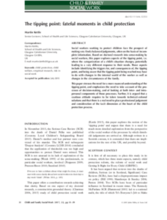Social workers face the prospect using incomplete information to make very finely balanced judgements. Based on doctoral research into sense-making by social workers, this paper explores aspects of the tipping point, i.e. where the categorization of a child's situation changes, potentially leading to a very different response to their needs. Those aspects include identifying the triggers for, and consequences of, the tipping point, and being aware that the tipping point being reached may have to do with changes in the internal world of the worker as well as changes in the circumstances of the family.
This paper reviews the case of Daniel Pelka, a child in Scotland who was murdered at the hands of his mother and her partner. In an interest of obtaining clarity in decision-making, this paper stresses the need for a more nuanced understanding of the tipping point, emphasizes the need to take account of the processes of decision-making and of looking at both inter- and intra-personal components of those processes. Further, it argues that a cautious attitude is required to develop rational solutions. There is a genuine need to place professional judgement and consideration of the tacit dimension at the heart of the child protection process.

